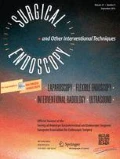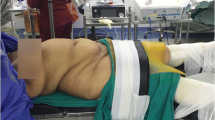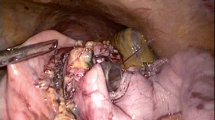Abstract
Background
Standard sleeve gastrectomy for the morbidly obese is feasible and safe using the hybrid transvaginal minilaparoscopic-assisted natural orifice surgery (MA-NOS) with available laparoscopic/endoscopic instruments and technology as illustrated by this technical report on a female patient.
Methods
The intervention was a transvaginal sleeve gastrectomy in a 67-year-old woman who was hypertensive, noninsulin-dependent with diabetes with morbid obesity (BMI, 37). Operative field view was maintained at all times with a gastroscope introduced through a transvaginal trocar. The surgeon positioned himself at the right side of the patient using a 2-mm needle port/mini-grasper placed in the left upper quadrant for traction of the greater curvature of the stomach. A 12-mm umbilical trocar was used as the port for insertion of the LigaSure device used for division of the short gastric vessels and the Endo-GIA stapler for creation of the gastric tube. The first assistant used a second mini-grasper for liver retraction and stomach positioning. The resected stomach was retrieved through the vagina. There were no intraoperative complications. The operative time was 150 minutes.
Results
The advantages of minimally invasive surgery seemed to be enhanced with this hybrid laparoscopic approach. Postoperative course was uneventful. All component steps of a laparoscopic sleeve gastrectomy (LSG) were reproduced. The patient was discharged on the third postoperative day.
Conclusions
Transvaginal hybrid MA-NOS sleeve gastrectomy is both feasible and safe. The hybrid technique ensured safety during the performance of the procedure. MA-NOS is a potential option to avoid abdominal incisions and related complications for the laparoscopic resection of large intra-abdominal organs. Combined hybrid laparoscopic NOS for humans is currently a safe and reliable approach for major surgery through the NOS approach in female patients. Hybrid surgery allows controlled implementation of NOS techniques in clinical practice, providing a stepwise progression to the pure NOS approach once the appropriate technology has been developed. Additionally, it is the best way to stimulate the active development and evaluation of the underpinning technologies and instruments for these novel endoscopic surgical approaches. Appropriate clinical indications for these new procedures are yet to be defined. LSG is associated with short-term excess weight loss and resolution of comorbidities comparable to those obtained with other restrictive procedures. The performance of sleeve gastrectomy is an option in selected patients undergoing bariatric surgical treatment, particularly in the super obese and those who are considered high risk because of comorbid disease.
Similar content being viewed by others
References
Kalloo AN, Singh VK, Jagannath SB, Niiyama H, Hill SL, Vaughn CA, Magee CA, Kantsevoy S (2004) Flexible transgastric peritoneoscopy: a novel approach to diagnostic and therapeutic interventions in the peritoneal cavity. Gastrointest Endosc 60:114–117
Kantsevoy SV, Jagannath SB, Niiyama H, Chung Sydney SC, Cotton PB, Gostout CJ, Hawes RH, Pasricha PJ, Magee CA, Vaughn CA, Barlow D, Shimonaka H, Kalloo AN (2005) Endoscopic gastrojejunostomy with survival in a porcine model. Gastrointest Endosc 62:287–292
Kantsevoy SV, Hu B, Jagannath SB, Vaughn CA, Beitler DM, Chung SSC, Cotton PB, Gostout CJ, Hawes RH, Pasricha J, Magee CA, Pipitone LJ, Talamini MA, Kalloo AN (2006) Transgastric endoscopic splenectomy: is it possible? Surg Endosc 20:522–525
Merrifield BF, Wagh MS, Thompson CC (2006) Peroral transgastric organ resection: a feasibility study in pigs. Gastrointest Endosc 63:693–697
Wagh MS, Merrifield BF, Thompson CC (2005) Endoscopic transgastric abdominal exploration and organ resection: initial experience in a porcine model. Clin Gastroenterol Hepatol 3:892–896
Pearl JP, Onders RP, Marks JM, Chak A, Mcgee MF, Rosen M, Ponsky JL (2007) Transgastric endoscopic peritoneoscopy in humans under laparoscopic visualization: a bridge to NOTES. Gastrointest Endosc 65:AB292
Whiteford MH, Denk PM, Swanstrom LL (2007) Feasibility of radical sigmoid colectomy performed as natural orifice translumenal endoscopic surgery (NOTES) using transanal endoscopic microsurgery. Surg Endosc 21:1870–1874
Pai RD, Fong DG, Bundga ME, Odze RD, Rattner DW, Thompson CC (2006) Transcolonic endoscopic cholecystectomy: a NOTES survival study in a porcine model (with video). Gastrointest Endosc 64:428–434
Gettman MT, Blute ML (2007) Transvesical peritoneoscopy: initial clinical evaluation of the bladder as a portal for natural orifice translumenal endoscopic surgery. Mayo Clin Proc 82:843–845
Pearl JP, Marks JM, Ponsky JL (2008) Hybrid surgery: combined laparoscopy and natural orifice surgery. Gastrointest Endosc Clin N Am 18:325–332
Rao GV (2006) Transgastric appendectomy results and follow-up: SAGES transgastric surgery panel. Presented at SAGES Meeting
Marescaux J, Dallemagne B, Perretta S, Wattiez A, Mutter D, Coumaros D (2007) Surgery without scars: report of transluminal cholecystectomy in a human being. Arch Surg 142:823–827
Bessler M, Stevens PD, Milone L (2007) Transvaginal laparoscopic cholecystectomy: laparoscopically assisted. SAGES Meeting. V029
Lacy AM, Delgado S, Rojas OA, Almenara R, Blasi A, Llach J (2008) MA-NOS radical sigmoidectomy: report of a transvaginal resection in the human. Surg Endosc 22:1717–1723
Rattner D, Kalloo AN (2006) ASGE/SAGES working group on natural orifice translumenal endoscopic surgery October 2005, and the SAGES/ASGE working group on natural orifice translumenal endoscopic surgery. White Paper Surg Endosc 20:329–333
Branca F, Nikogosian H, Lobstein T (2007) The challenge of obesity in the WHO European region and the strategies for response: summary. Publication World Health Organization Regional Office for Europe, ISBN 978 92 890 1388 8 (print), ISBN 978 92 890 1407 6 (ebook) (NLM Classification: WD 210)
Wang Y, Lobstein T (2006) Worldwide trends in childhood overweight and obesity. Int J Pediatr Obes 1:11–25
Ogden CL, Carroll MD, Curtin LR, McDowell MA, Tabak CJ, Flegal KM (2006) Prevalence of overweight and obesity in the United States 1999–2004. JAMA 295:1549–1555
Fontaine KR, Redden DT, Wang C, Westfall AO, Allison DB (2003) Years of life lost due to obesity. JAMA 289:187–193
Peeters A, Barendregt JJ, Willekens F, Mackenbach JP, Al Manum A, Bonneux L, NEDCOM, the Netherlands Epidemiology and Demography Compression of Morbidity Research Group (2003) Obesity in adulthood and its consequences for life expectancy: a life-table analysis. Annals Intern Med 138:24–32
Thompson D, Brown JB, Nichols GA, Elmer PJ, Oster G (2001) Body mass index and future healthcare costs: a retrospective cohort study. Obes Res 9:210–218
Sjöström L, Narbro K, Sjöström CD, Karason K, Larsson B, Wedel H, Lystig T, Sullivan M, Bouchard C, Carlsson B, Bengtsson C, Dahlgren S, Gummesson A, Jacobson P, Karlsson J, Lindroos AK, Lönroth H, Näslund I, Olbers T, Stenlöf K, Torgerson J, Agren G, Carlsson LM, Swedish Obese Subjects Study (2007) Effects of bariatric surgery on mortality in Swedish obese subjects. N Engl J Med 357:741–752
Adams TD, Gress RE, Smith SC, Halverson RC, Simper SC, Rosamond WD, Lamonte MJ, Stroup AM, Hunt SC (2007) Long-term mortality after gastric bypass surgery. N Engl J Med 357:753–761
Ghezzi F, Raio L, Mueller MD, Gyr T, Buttarelli M, Franchi M (2002) Vaginal extraction of pelvic masses following operative laparoscopy. Surg Endosc 16:1691–1696. doi:10.1007/s00464-002-9043-z
McGee MF, Rosen MJ, Marks J, Onders RP, Chak A, Faulx A, Chen VK, Ponsky J (2006) A primer on natural orifice transluminal endoscopic surgery: building a new paradigm. Surg Innov 13:86–93
Boni L, Benevento A, Rovera F, Dionigi G, Di Giuseppe M, Bertoglio C, Dionigi R (2006) Infective complications in laparoscopic surgery. Surg Infect (Larchmt) 7(Suppl 2):S109–S111
Mintz Y, Horgan S, Savu MK, Cullen J, Chock A, Ramamoorthy S, Easter DW, Talamini MA (2008) Hybrid natural orifice translumenal surgery (NOTES) sleeve gastrectomy: a feasibility study using an animal model. Surg Endosc 22:1798–1802
Della Flora E, Wilson TG, Martin IJ, O’Rourke NA, Maddern GJ (2008) A review of natural orifice translumenal endoscopic surgery (NOTES) for intra-abdominal surgery: experimental models, techniques, and applicability to the clinical setting. Ann Surg 247:583–602
Voermans RP, Van Berge Henegouwen MI, Fockens P (2007) Natural orifice transluminal endoscopic surgery (NOTES). Endoscopy 39:1013–1017
Whiteford MH, Swanstrom LL (2007) Emerging technologies including robotics and natural orifice transluminal endoscopic surgery (NOTES) colorectal surgery. J Surg Oncol 96:678–683
Ramos AC, Zundel N, Neto MG, Maalouf M (2008) Human hybrid NOTES transvaginal sleeve gastrectomy: initial experience. Surg Obes Relat Dis 4:660–663
Akkary E, Duffy A, Bell R (2008) Deciphering the sleeve: technique, indications, efficacy, and safety of sleeve gastrectomy. Obes Surg. doi:10.1007/s11695-008-9551-6
Gumbs A, Gagner M, Dakin G, Pomp A (2007) Sleeve gastrectomy for morbid obesity. Obes Surg 17:962–969
Vidal J, Ibarzabal A, Romero F, Delgado S, Momblán D, Flores L, Lacy A (2008) Type 2 diabetes mellitus and the metabolic syndrome following sleeve gastrectomy in severely obese subjects. Obes Surg. doi:10.1007/s11695-008-9547-2
Langer FB, Reza Hoda MA, Bohdjalian A, Felberbauer FX, Zacherl J, Wenzl E, Schindler K, Luger A, Ludvik B, Prager G (2005) Sleeve gastrectomy and gastric banding: effects on plasma ghrelin levels. Obes Surg 15:1024–1029
Lin E, Gletsu N, Fugate K, McClusky D, Gu LH, Zhu JL, Ramshaw BJ, Papnicolaou DA, Ziegler TR, Smith CD (2004) The effects of gastric surgery on systemic ghrelin levels in the morbidly obese. Arch Surg 139:780–784
Karamanakos SN, Vagenas K, Kalfarentzos F, Alexandrides TK (2008) Weight loss, appetite suppression, and changes in fasting and postprandial ghrelin and peptide-YY levels after Roux-en-Y gastric bypass and sleeve gastrectomy: a prospective, double-blind study. Ann Surg 247:401–407
Cottam D, Qureshi FG, Mattar SG, Sharma S, Holover S, Bonanomi G, Ramanathan R, Schauer P (2006) Laparoscopic sleeve gastrectomy as an initial weight-loss procedure for high-risk patients with morbid obesity. Surg Endosc 20:859–863
Tucker ON, Szomstein S, Rosenthal RJ (2008) Indications for sleeve gastrectomy as a primary procedure for weight loss in the morbidly obese. J Gastrointest Surg 12:662–667
Lalor PF, Tucker ON, Szomstein S et al (2008) Complications after laparoscopic sleeve gastrectomy. Surg Obes Relat Dis 4:33–38
Zhang W, Mason E, Renquist K et al (2005) Factors influencing survival following surgical treatment of obesity. Obes Surg 15:43–50
Iannelli A, Dainese R, Piche T, Facchiano E, Gugenheim J (2008) Laparoscopic sleeve gastrectomy for morbid obesity. World J Gastroenterol 14:821–827
Author information
Authors and Affiliations
Corresponding author
Rights and permissions
About this article
Cite this article
Lacy, A.M., Delgado, S., Rojas, O.A. et al. Hybrid vaginal MA-NOS sleeve gastrectomy: technical note on the procedure in a patient. Surg Endosc 23, 1130–1137 (2009). https://doi.org/10.1007/s00464-008-0292-3
Received:
Accepted:
Published:
Issue Date:
DOI: https://doi.org/10.1007/s00464-008-0292-3




